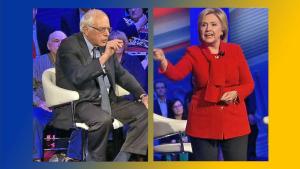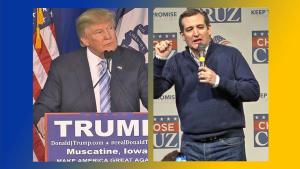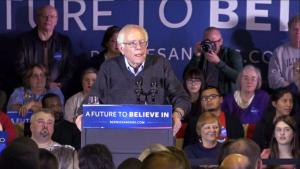Sunday, January 31, 2016
Saturday, January 30, 2016
Super Bowl 50 Grounds Crew Accidentally Paints Two Broncos Endzones
YOU HAD ONE JOB
The old Chiefs commercial from the 90's where they accidentally paint 'Chefs' instead of 'Chiefs' has practically come to life...
DAILYSNARK.COM
Friday, January 29, 2016
Thursday, January 28, 2016
Cam Newton: When You Win, That Gives Them Something Else to Talk About |...
Cam Newton: When You Win, That Gives Them Something Else to Talk About |...
Wednesday, January 27, 2016
WhatsApp service stumbles briefly
BY AGENCE FRANCE PRESSE · JANUARY 26TH, 2016

Facebook-owned smartphone messaging service WhatsApp temporarily crashed in an array of countries from the US to India, potentially affecting hundreds of millions of users.
Reports of people having trouble with WhatsApp in countries including Japan, India, Malaysia, Colombia and the United States hit the Internet about 0200 GMT Tuesday.
The outage appeared to be resolved in most locations in an hour or so, according to Downdetector.com, which calls itself “the weatherman for the digital world.”
Comments posted by users indicated they were having intermittent difficulties with WhatsApp during the problem period.
Facebook did not respond to an AFP request for comment.
The disruption came on the heels of media reports that Facebook is working behind the scenes to integrate WhatsApp more snugly into the world’s leading social network by providing the ability to share information between the services.
California-based Facebook bought WhatsApp for $19 billion in late 2014 and the messaging service has grown to nearly a billion users.
http://www.capitalfm.co.ke/lifestyle/2016/01/26/whatsapp-service-stumbles-briefly/
Kenyan troops abandon Somali camp to al Shabaab militants

MOGADISHU (Reuters) - Kenyan soldiers have abandoned a camp in the southern Somali town of El Adde following an attack by al Shabaab, a military spokesman said, and the islamist militants said they had taken full control of the base on Tuesday.
The Kenyan troops, part of an African Union (AU) force in Somalia (AMISOM), took heavy losses when al Shabaab launched a dawn raid on the camp near the Kenyan border on Jan. 15.
David Obonyo, spokesman for the Kenya Defence Forces, said the troops had vacated the camp, and were now stationed nearby.
Al Shabaab, which has links to al Qaeda and seeks to overthrow Somalia's Western-backed government, said it had killed more than 100 soldiers in the attack. The militants are seeking to drive the AU force out of Somalia.
Kenyan officials have not yet revealed the death toll but newspaper pictures of coffins draped with Kenyan flags bringing back dead soldiers has increased pressure on President Uhuru Kenyatta and his military chiefs.
Al Shabaab has inflated casualty figures in the past, while other official estimates often play down numbers.
In a statement, al Shabaab spokesman Sheikh Abdiasis Abu Musab, said the group was now in control of the town.
"This morning we peacefully captured El Adde," he told Reuters, in a claim that was echoed by local residents.
Kenyan officials have not yet revealed the death toll but newspaper pictures of coffins draped with Kenyan flags bringing back dead soldiers has increased pressure on President Uhuru Kenyatta and his military chiefs.
(Reporting by Feisal Omar and Duncan Miriri; writing by Edith Honan; editing by Ralph Boulton)
https://www.yahoo.com/news/kenyan-troops-abandon-somali-camp-al-shabaab-militants-144643870.html?nhp=1
Heat Minority Owner Says LeBron James Had David Blatt Fired And 'Tried The Same With Spo'
Jamie Cooper
January 27, 2016

GETTY IMAGE
It’s been posited elsewhere that the only reason Erik Spoelstra remained in his position as head coach during the rocky early days of the Big-3 era in Miami is because he had the backing of Pat Riley. And Tuesday, as the media was still trying to make sense of David Blatt’s sudden ouster as head coach in Cleveland, Heat minority owner Raanan Katz did his best to perpetuate the narrative that LeBron James was directly responsible, claiming that the two-time champ tried the same tactic with Spoelstra.
Miami Heat part-owner Raanan Katz said LeBron had Blatt fired. In same breath: "He tried the same with Spo, but failed."— David Pick (@IAmDPick) January 26, 2016
Of course, both James and Cavs GM David Griffin have vehemently denied the King’s involvement in the move, and it could also simply be sour grapes on Katz’ part for James leaving Miami in the lurch back in the summer of 2014. One thing’s for certain: It’ll give more fodder to all the LeBron truthers who believe he’s the one pulling all the strings within the organization.
Another thing that gets lost in all the noise is the fact that it’s still far too early to tell whether Blatt’s dismissal was the right move for the team, and it’s a question that may not have a clear answer even after the Finals this spring depending on how things pan out. LeBron’s reputation was always going to take a hit for this. That part was inevitable. And now only a championship trophy can help repair that.
https://www.yahoo.com/news/heat-minority-owner-says-lebron-001005792.html?nhp=1
Trump Says He 'Most Likely' Will Skip Thursday FOX News Debate
by CARRIE DANN
Donald Trump said Tuesday that he "most likely" will not participate in Thursday's night's FOX News-Google debate, citing the participation of "lightweight" Megyn Kelly as well as FOX's "wise-guy" press release poking fun at Trump's rhetoric.
"Let's see how much money FOX is going to make on the debate without me," he told reporters in Marshalltown, Iowa.
The GOP frontrunner added that he hopes to plan an alternate event raising money for members of the military in lieu of participating in the Thursday night clash.
Trump also blasted FOX News for issuing a sarcastic press release in response to his threats to skip the debate.
The statement from a FOX News spokesperson read: "We learned from a secret back channel that the Ayatollah and Putin both intend to treat Donald Trump unfairly when they meet with him if he becomes president — a nefarious source tells us that Trump has his own secret plan to replace the Cabinet with his Twitter followers to see if he should even go to those meetings."
Trump said that response was "written by a child."
In recent days, Trump has hinted that he might skip out on the debate due to what he calls the "bias" of moderator Megyn Kelly, with whom he has feuded throughout the campaign.
He mused about boycotting the debate in an Instagram video posted on Tuesday.
But Fox News Chairman and CEO Roger Ailes said in a statement that Kelly is locked in as a moderator for the Thursday night clash.
"Megyn Kelly is an excellent journalist and the entire network stands behind her — she will absolutely be on the debate stage on Thursday night," he said.
Earlier Tuesday, the network announced its lineup for Thursday night's undercard and primetime GOP debates, featuring victories for Rand Paul - who made the cut for the 9pm ET event - and former Virginia Gov. Jim Gilmore, who will debut on the undercard stage.
Qualifying for the 9pm ET primetime debate, hosted by FOX News and Google, are Trump, Ted Cruz, Marco Rubio, Ben Carson, Jeb Bush, Chris Christie, John Kasich and Paul.
And qualifying for the 7pm ET undercard event are Gilmore, Mike Huckabee, Rick Santorum and Carly Fiorina.
Paul, who boycotted the last GOP debate after being relegated to the undercard contest, performed well enough in public polling to meet the network's threshold for participation in Thursday's main event.
Gilmore has done minimal traditional campaigning, has barely registered in public polls and has never participated in a GOP debate to date.
http://www.nbcnews.com/politics/first-read/fox-news-announces-lineup-thursday-s-gop-debate-n504831
Tuesday, January 26, 2016
GOPers Call Trump the Likely Winner; His Lead Stays Big, With Cruz Behind (POLL)
By GARY LANGER
1:37
/ 1:59

ABC News Videos
-
 1:59NOW WATCHINGWill Donald Trump Change His Campaign With an Iowa Win?
1:59NOW WATCHINGWill Donald Trump Change His Campaign With an Iowa Win? - 2
 5:03Donald Trump on His Double-Digit Lead Against Ted Cruz
5:03Donald Trump on His Double-Digit Lead Against Ted Cruz - 3
 2:19Final Iowa Push for Republican, Democratic Presidential Candidates
2:19Final Iowa Push for Republican, Democratic Presidential Candidates - 4
 3:30Donald Trump, Ted Cruz Face Off in Iowa
3:30Donald Trump, Ted Cruz Face Off in Iowa - 5
 2:01Presidential Candidates Countdown to the Iowa Caucus
2:01Presidential Candidates Countdown to the Iowa Caucus - 6
 0:22American Tourist Killed in Grenada
0:22American Tourist Killed in Grenada - 7
 0:44Dog Finishes 7th in Alabama Half-Marathon
0:44Dog Finishes 7th in Alabama Half-Marathon - 8
 0:37Bat and Pole Fly in Road Rage Incident Caught on Tape
0:37Bat and Pole Fly in Road Rage Incident Caught on Tape - 9
 1:54Parents Capture Daughter's Long Prayer on Baby Monitor
1:54Parents Capture Daughter's Long Prayer on Baby Monitor - 10
 2:18Casey Affleck Sets Sail in 'The Finest Hours'
2:18Casey Affleck Sets Sail in 'The Finest Hours'
Donald Trump holds his lead for the GOP nomination and has soared in expectations: 64 percent of Republicans and Republican-leaning independents now expect him to be the party’s nominee, up sharply in the last two months.
Expectations that Trump will win the nomination have jumped by 25 percentage points since November among Republican-leaning voters in a new ABC News/Washington Post poll. Two-thirds also say they’d accept him as their party’s nominee. And he’s seen by 56 percent as their most electable nominee in the general election this fall.
Trump has 37 percent support nationally among Republicans who are registered to vote, unchanged from last month (with no bounce from his endorsement by Sarah Palin). Ted Cruz has advanced by a slight 6 points from last month, and 15 points from October, to a clear, if somewhat distant, second place, with 21 percent. Marco Rubio’s in the third slot, 11 percent, with all others in the single digits in this poll, produced for ABC by Langer Research Associates.
Rubio appears to have a stand-in shot – he does well as a second choice, selected by 23 percent now vs. 14 percent last month. Ben Carson, for his part, has continued to crater, showing the sometime changeability of voter preferences: he’s gone from 22 percent two months ago to 7 percent now, almost precisely swapping places with Cruz.
View gallery

GOPers Call Trump the Likely Winner; His Lead Stays Big, With Cruz Behind (POLL) (ABC News)
There’s essentially no change among lower-tier candidates – 5 percent for Jeb Bush, 4 percent for Chris Christie, 3 percent for Carly Fiorina, 2 percent apiece for John Kasich and Mike Huckabee, 1 percent for Rand Paul and less than that for Rick Santorum.
These standings reflect, above all, two factors: the strength of leaned Republicans’ interest in a candidate from outside the political establishment, and the power of anti-immigrant views in the party. Statistical analysis finds that these two are the single strongest independent predictors of supporting Trump vs. any of his opponents. They’re also issues on which the rest of the public differs dramatically from prevailing GOP sentiment, raising challenges for the party in the general election ahead.
Underscoring party preferences for an outsider, it’s the more traditional GOP candidates – Bush and Christie – who are less apt to be rated as acceptable nominees. Just 52 percent of leaned Republicans see either as acceptable; Rubio, Cruz, Trump and Carson all do better on this score, rated as acceptable by 67, 66, 65 and 62 percent, respectively.
Strength
Fifty-six percent of leaned Republicans have a favorable opinion of Palin (unlike the rest of the public, who view her unfavorably by a broad 69-16 percent). That said, her endorsement of Trump last week shows no impact on vote preferences: His support is unchanged from its pre-endorsement level. Ten percent of leaned Republicans say the endorsement makes them more likely to support Trump, but as many, 9 percent, say it makes them less likely to do so. Most by far, 81 percent, say it makes no difference to their vote.
Endorsements customarily don’t change preferences but, at best, reinforce them. And Trump’s support appears strong: Fifty-seven percent of his backers say they’ll definitely support him; among all other GOP candidates combined, strength of support declines to 35 percent, with the rest saying they may yet change their minds.
Additionally, Trump’s support is essentially the same whether it’s among all registered leaned Republicans or those indicating they’re most likely to vote in the caucus or primary in their state. And there are no meaningful divisions in his support among key GOP groups – e.g., whether mainline Republicans or independents, evangelicals or not, or by strength of ideology (moderates vs. somewhat conservatives vs. strong conservatives). He continues to do somewhat better with lower-income leaned Republicans; differences by education and gender have faded.
Cruz, by contrast, does best with strong conservatives and evangelicals, and better with men than with women.
Trump’s support, as noted, continues to spring from anti-establishment and anti-immigrant sentiment within the GOP, buttressed by economic discontent and by a broad sense among the rank and file that he’d be the party’s most electable pick. Among those results:
• His backing soars to 53 percent among leaned Republicans who strongly feel that immigrants weaken U.S. society, vs. 24 percent among those who think immigrants strengthen this country. The former view is far more prevalent within the GOP.
• Leaned Republicans by 54-42 percent chiefly want a candidate from outside the political establishment. Among those who are in the anti-establishment group, and registered to vote, 51 percent pick Trump over his 10 rivals tested in this poll.
• Among those who are very worried about their economic prospects (27 percent of registered leaned Republicans), Trump gets 45 percent support, vs. 28 percent among those who aren’t worried.
• Fifty-one percent think Trump is the best choice to bring needed change to Washington, perhaps the single most crucial attribute to leaned Republicans – 83 percent of whom express dissatisfaction or even anger with the way things are working in the capital.
• As noted, 56 percent of leaned Republicans think Trump has the best chance to win the general election in November, up 9 points from last month. And the sharp increase in expectations that he’ll win the party’s nomination has been broadly based, occurring across GOP groups. While attitudes certainly can shift with events, some academic work has suggested that public expectations for who’ll win an election can be credible predictors of actual outcomes.
These results, in any case, are intended to explore how Americans across the country are approaching the election – their issues and attributes that matter to them and how these play out, among various groups, in candidate preferences. The results don’t forecast the outcome of any individual caucus or primary. Low-turnout events such as caucuses can be heavily influenced by effective get-out-the-vote operations and by prevalent population groups; high numbers of evangelical Christians, for instance, often participate in Iowa caucuses. Primaries have their own dynamics; in New Hampshire’s, for example, independent voters are unusually numerous.
In an ABC/Post poll in December 2011, Newt Gingrich had 30 percent support nationally and Santorum had 4 percent; in the Iowa caucus the next month, by contrast, Gingrich won 13 percent of the vote, Santorum 25 percent. It was Mitt Romney – co-leader in the national poll, and co-leader in the Iowa caucus results – who went on to win the nomination. (And Romney consistently led in expectations leading up to the 2012 primaries, even as many of his rivals opened up sometimes sizable leads against him in vote intention questions.)
It’s worth noting, as well, that even among Trump’s supporters 42 percent say they may yet change their minds, as do 64 percent of those supporting other candidates. That makes for plenty of room for movement as the contest unfolds in the weeks ahead.
Attributes/Issues
Trump has less of an advantage on some personal attributes – notably on having the best personality and temperament to serve as president (24 percent pick Cruz on this attribute, despite his alleged lack of collegiality, vs. Trump’s 22 percent) and honesty and trustworthiness (Trump 27 percent, Carson 24, Cruz 17). In being “closest to you on the issues” 36 percent pick Trump, but Cruz, at 20 percent, has moved up, with a 12-point gain since fall.
Trump, separately, leads on most issues: Fifty-five percent pick him as best able to handle the economy, up 8 points from December. Fifty percent prefer him on regulating banks and financial institutions. And he continues to lead widely in trust to handle terrorism and immigration issues.
That said, Trump does notably less well in trust to handle a major international crisis; he’s selected by 31 percent on this issue vs. Cruz’s 23 percent and Bush’s 17 percent – one area in which his rivals might find ammunition.
Reps vs. the rest
In a data analysis assessing the strongest independent correlates of vote preference for Trump, desire for an outsider is the single strongest factor, followed by anti-immigration views. Desiring an outsider, in turn, is independently related to an index of broader discontent, including anger at the way the government is working; a sense that government is part of the problem rather than part of the solution; views that the country’s best days are behind it; whether it’s on the wrong track; a sense that one’s own values are losing ground in society; and economic anxiety.
A challenge for the GOP, looking ahead, is the extent to which leaned Republicans differ from the rest of the public on many such measures. While 54 percent of leaned Republicans are looking chiefly for an outsider, among all other Americans, 75 percent prefer a candidate with experience in how the political system works. While 50 percent of leaned Republicans say immigrants mainly weaken U.S. society, 66 percent of others say they mainly strengthen it. And there’s a vast 45-point difference in views on whether the country’s on the wrong track.
Leaned Republicans also are 27 points more apt than others to see government as part of the problem; twice as likely to be angry about it; 17 points more likely to see America’s best days as behind it; and 15 points more apt to say their own values are losing ground in society today.
Economic worry is the only one of these in which significant differences aren’t evident. On the others, whichever Republican wins the nomination, there will be substantial work ahead in reconciling world views within the GOP with those beyond it.
Methodology
This ABC News/Washington Post poll was conducted by landline and cellular telephone Jan. 21-24, 2016, in English and Spanish, among a random national sample of 1,001 adults. Results have amargin of sampling error of 3.5 points, including the design effect, for the full sample; 4 points for all registered voters; and 5.5 points for registered leaned Republicans. Partisan divisions are 34-23-34 percent, Democrats-Republicans-independents.
The survey was produced for ABC News by Langer Research Associates of New York, N.Y., with sampling, data collection and tabulation by Abt-SRBI of New York, N.Y. See details on the survey’s methodology here.
https://gma.yahoo.com/gopers-call-trump-likely-winner-lead-stays-big-150316229--abc-news-topstories.html#
Subscribe to:
Posts (Atom)








